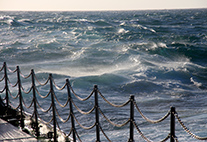Universität Hamburg and the University of Bremen investigate energy exchange in the ocean and atmosphere
27 May 2016, by CEN Universität Hamburg

Photo: UHH/CEN/T. Wasilewski
Universität Hamburg (coordination) and the University of Bremen, together with other partners, will receive funding of ca. nine million euros from the German Research Foundation (DFG) for the Collaborative Research Center/Transregio 181 “Energy Transfers in Atmosphere and Ocean”.
Universität Hamburg (coordination) and the University of Bremen, together with other partners, will receive funding of ca. nine million euros from the German Research Foundation (Deutsche Forschungsgemeinschaft (DFG)) through 2020. The Collaborative Research Center/Transregio 181 “Energy Transfers in Atmosphere and Ocean” (TRR 181) aims for a better understanding of small-scale effects in order to improve current climate models.
Anyone who has ever added cream to a cup of coffee will have noticed how turbulent currents cause the two liquids to mix. What happens on a small scale in the coffee cup is very similar to what occurs in the atmosphere and oceans. There the smallest-scale physical processes are linked to global winds and currents – and have a major impact on the global climate.
The researchers involved in this interdisciplinary project will investigate these turbulent processes and wave phenomena in order to improve current climate models and develop new ones with closed energy balances. “Despite all the advances that have been achieved, there are still energy and mathematical inconsistencies in the existing climate models, which can lead to significant errors in climate predictions,” explains Prof. Carsten Eden from Universität Hamburg’s Center for Earth System Research and Sustainability (CEN), the project spokesman. “It’s time for the various disciplines to work together and to pursue new avenues.”
Oceanographers, meteorologists and mathematicians will work together closely on the project, with the aim of better understanding and coherently describing energy exchange in the climate system, as well as developing physically and mathematically improved ocean and atmospheric models.
According to Universität Hamburg President, Prof. Dieter Lenzen: “This success will not only further reinforce our longstanding cooperation with the University of Bremen, but will also make our ties closer. Congratulations to all the colleagues from both universities and thank you for your hard work!”
The Rector of the University of Bremen, Prof. Bernd Scholz-Reiter, adds: “The collaboration with Hamburg and our other partners shows that the universities and academic institutions in northern Germany are actively working together to pursue research of the highest caliber. I’m delighted that we will be able to extend that cooperation further in the new project.”
Universität Hamburg and the University of Bremen secured funding from the German Research Foundation (DFG) SFB / Transregio project series. The project will bring together institutes in Hamburg, Bremen and Rostock and will be coordinated at Universität Hamburg’s CEN research center. The other partners include Jacobs University in Bremen; the Alfred Wegener Institute – Helmholtz Center for Polar and Marine Research; the Leibniz Institute for Atmospheric Physics and the Leibniz Institute for Baltic Sea Research (both at the University of Rostock); the Max Planck Institute for Meteorology, and the Helmholtz Centre for Materials and Coastal Research in Geesthacht. The four-year project can be extended for a maximum of eight additional years.

Prof. Carsten Eden, spokesman for the new project, is an oceanographer at the Center for Earth System Research and Sustainability.
His research interests include describing the ocean’s dynamics and motion using mathematical and physical models.
Image: UHH/CEN
Contact:
- Prof. Carsten Eden, Spokesman for the SFB / Transregio
- Elisabeth Weidinger(elisabeth.weidinger"AT"uni-hamburg.de), Press enquiries and public relations, 040 42838 - 2134
